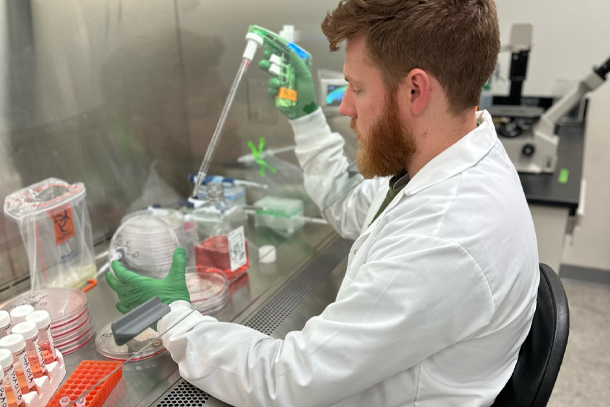
Penn State biomedical engineering doctoral candidate Josh Reynolds and his research lab mates are striving to overcome drug resistance and accelerate drug discovery efforts in the fight against cancer with their startup, Atlas Biotech. Credit: Provided by Josh Reynolds
Researchers aim to streamline cancer therapy development process
Doctoral candidate Josh Reynolds participates in I-Corps Short Course to develop Atlas Biotech startup
November 17, 2023
Editor’s note: This article first appeared on Penn State News.
UNIVERSITY PARK, Pa. — Targeted therapy is a type of cancer treatment that uses drugs designed to target the changes in cancer cells that help them grow, divide and spread. But, over time, cancer cells can become less sensitive to the effects of a specific drug, rendering the treatment ineffective. This phenomenon, known as drug resistance, results in 90% of cancer-associated relapses and deaths, according to the National Cancer Institute. Unfortunately, Penn State researchers said, the development of next-generation therapies — compounds that could treat drug-resistant cancer — can be a slow and expensive process for researchers at academic labs and pharmaceutical companies alike.
Penn State biomedical engineering doctoral candidate Josh Reynolds, along with his research lab mates, are striving to overcome drug resistance and accelerate drug discovery efforts in the fight against cancer with their startup, Atlas Biotech.
Reynolds said that Atlas Biotech aims to work with academic labs and pharmaceutical companies across the country during the preclinical drug development phase, when drug candidates are initially tested in the lab — before testing in patients can be performed. Atlas Biotech may be able to help more quickly and efficiently predict which drugs cancers will develop resistance to by testing the drugs and building mutational maps, which detail potential drug resistance pathways accessible to the cancer cells. This early-stage testing aims to ensure that the drugs that are more likely to be successful are quickly identified and moved forward in the discovery and development process.
“Our flagship service, a process that determines where a drug is going to have resistant mutations and compares that to existing targeted therapies, will provide information that no one else is offering right now,” Reynolds said. “Through this process, we will hopefully help companies make better decisions on which assets to prioritize and speed up the rate at which those decisions are made. Ultimately, we want to bring better therapeutic options to cancer patients, faster.”
The Atlas Biotech team consists of Reynolds, biomedical engineering postdoctoral scholar Haider Inam and Assistant Research Professor Marta Tomaszkiewicz. The research originated in the Systems and Synthetic Biology Lab, which is directed by Justin Pritchard, associate professor of biomedical engineering.
“The process we are developing has been worked on in this lab for almost six years, but the current team really came together in the past year and a half, with Marta bringing in a lot of genomics experience,” Reynolds said. “And so, we’ve been able to move a lot faster. Everybody has someone they know that’s had or has cancer. We’re doing what we can to make a difference and make a positive impact.”
To make that impact, Reynolds started looking for entrepreneurship opportunities at Penn State to start on the path toward bringing their service to the market.
This fall, Atlas Biotech participated in Invent Penn State’s NSF I-Corps Short Course program, which provides researchers with the opportunity to learn skills in connecting with customers, asking the right questions and finding partners to help get startup ideas off the ground.
“The short course was a fantastic opportunity to make sure there is a market demand for what we’re trying to do,” Reynolds said. “The scientific approach of the lean startup methodology they teach was really appealing to me. I also got to talk to a lot of incredible people in industry and hear a lot of different perspectives. The instructors and guest speakers were also great — they were experienced business professionals who’ve done all this before, and they provided us with a lot of really useful insights.”
The Atlas Biotech team recently submitted their application for consideration for the I-Corps National Teams program, for which the I-Corps Short Course program is a pre-requisite. The National Teams program requires participants to conduct at least 150 customer interviews over the course of the program and provides up to $50,000 in funding and additional mentorship for participants.
“Being able to add on to our grant applications that we’ve completed the National Teams program and collected all this customer discovery data that we can point to will be compelling for reviewers,” Reynolds said.
Currently, the Atlas Biotech team is working to acquire grant funding that will go towards ensuring their service is consistent, efficient and scalable.
“I think the opportunities here at Penn State for entrepreneurial development are great, and people should be excited to go use them,” Reynolds said. “I know it can be daunting — taking that first step is tough. But this is the most fun I’ve had in a long time.”
Applications are now open for the next I-Corps Virtual Regional Short Course, which will take place in January. Interested participants must complete a self-guided I-Corps Prep mini-course by Dec. 20.
About NSF I-Corps
The NSF I-Corps program uses experiential education to help researchers gain valuable insight into entrepreneurship, starting a business or industry requirements and challenges. I-Corps enables the transformation of invention to impact. The curriculum integrates scientific inquiry and industrial discovery in an inclusive, data-driven culture driven by rigor, relevance and evidence. Through I-Corps training, researchers can reduce the time to translate a promising idea from the laboratory to the marketplace. Penn State is part of the NSF I-Corps Mid-Atlantic Hub, a network of universities, NSF-funded researchers, established entrepreneurs, local and regional entrepreneurial communities, and other federal agencies. Hubs work collaboratively to build and sustain a diverse and inclusive innovation ecosystem throughout the United States.



